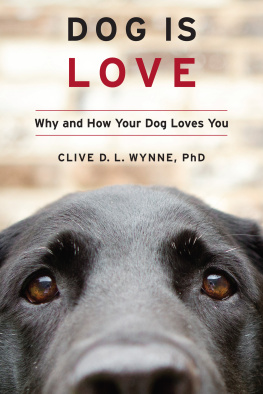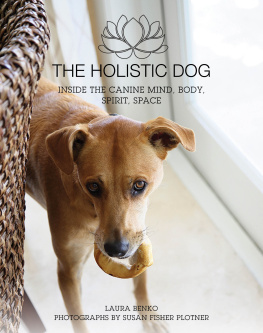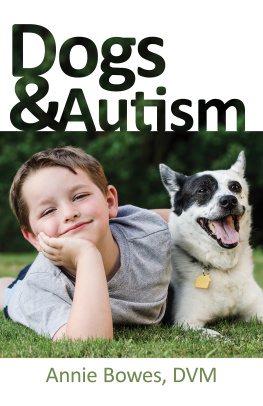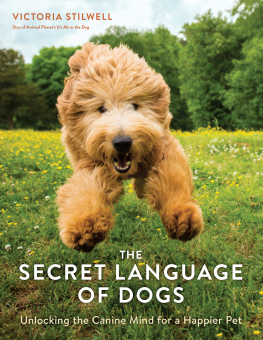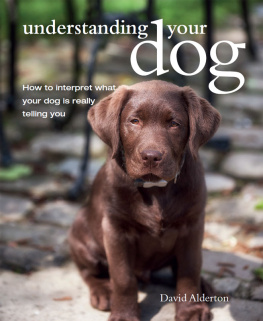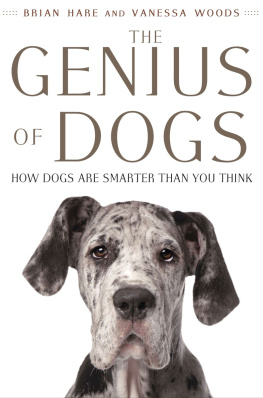Dog Body,
Dog Mind
Dr. Michael W. Fox
CAT BODY, CAT MIND (2007)
KILLER FOODS: WHEN SCIENTISTS MANIPULATE GENES, BETTER IS NOT ALWAYS BEST (2004)
BRINGING LIFE TO ETHICS: GLOBAL BIOETHICS FOR A HUMANE SOCIETY (2001)
EATING WITH CONSCIENCE: THE BIOETHICS OF FOOD (1997)
CONCEPTS IN ETHOLOGY, ANIMAL BEHAVIOR AND BIOETHICS (1997, revised edition)
THE BOUNDLESS CIRCLE (1996)
ST. FRANCIS OF ASSISI, ANIMALS, AND NATURE (1989)
THE NEW EDEN (1989)
THE NEW ANIMAL DOCTORS ANSWER BOOK (1989)
LABORATORY ANIMAL HUSBANDRY (1986)
THE WHISTLING HUNTERS (1984)
THE HEALING TOUCH FOR DOGS & THE HEALING TOUCH FOR CATS (2004)
LOVE IS A HAPPY CAT (1982)
INTEGRATIVE DEVELOPMENT OF BRAIN AND BEHAVIOR IN THE DOG (1971)
To buy books in quantity for corporate use or incentives, call (800) 962-0972 or e-mail premius@GlobePequot.com .
Copyright 2007 by Michael W. Fox
ALL RIGHTS RESERVED. No part of this book may be reproduced or transmitted in any form by any means, electronic or mechanical, including photocopying and recording, or by any information storage and retrieval system, except as may be expressly permitted in writing from the publisher. Requests for permission should be addressed to The Lyons Press,
Attn: Rights and Permissions Department, P.O. Box 480, Guilford, CT 06437.
The Lyons Press is an imprint of The Globe Pequot Press.
10
Printed in the United States of America
Designed by Sheryl P. Kober
ISBN 13: 978-1-59921-045-2
Library of Congress Cataloging-in-Publication Data is available on file.
For Deanna, and all we embrace
| Acknowledgments |
I wish to acknowledge the many dogs and other animals that have enriched my life and taught me much. I am especially grateful for the sensitive and skilled editorial work of Lilly Golden. To my publisher, Lyons Press, a word of thanks for helping me inform and inspire more understanding and compassion in our relationships with dogs and all creatures great and small.
| Introduction |
The primary purpose of this book is to further your understanding of your canine companions and how you communicate with them. This book will help you become more fluent in dog-speakto know what your dog is feeling, intending, and wanting. It will then be easier for your dog to communicate with you, especially when he or she wants to play, is distressed about something and wants your attention, or is possibly ill.
The human-animal bond is not only strengthened through improved understanding and communication. It is also reinforced through better care, and this book offers you precisely what is needed in this regard: a holistic approach to companion animal care and preventive medicine that will help guarantee a healthy and happy animal, and a healthy and happy bond between the two of you.
Many people are convinced that their dogs are psychic and can read their minds. Others contend that their companion animals have helped heal them and have even communicated from beyond the grave. Is all of this sheer fiction? Or are we dealing with a set of phenomena that our loyal dogs are revealing to usone that calls for a radical change in our concept of reality and in our understanding of these animal companions and indeed all creatures great and small? This book will help you find answers to these and other questions.
For many peopleincluding children and especially the lonely and the elderlyone of the deepest relationships they have enjoyed in their lives has been with their companion animals. This fact has touched me deeply as a result of my consultations with thousands of people over the years who sought my advice as a veterinarian and animal behavior therapist. In this book, I have put together the knowledge, insight, and concerns from this service work for the welfare of animals to provide some basic measuressome of which are long overdueto improve the health and well-being of dogs here in the United States and abroad. After all, dogs are very significant others in the lives of millions of people and in countless families around the world.
In times past, when our ancestors lived closer to nature and to wild and domesticated animals, there was no doubt that animals spoke to humans and were recognized as sharing an inner wisdom and connection with the sacred or metaphysical realm. They became guardians, teachers, and healersprovided the people whose lives they touched had an open heart and mind.
Today our hearts and minds are being opened by what amounts to a renaissance (literally, a rebirth) in our rediscovery of these animal powers and a recovery of the ancient wisdom, thanks to the millions of dogs that enrich our lives as family companions, playmates, and soul mates. They have much to offer us.
The only, if not the last, connection with all that is natural and not manmade for so many of us is our connection with domesticated animals. Their presence and spirit makes us feel more whole and secure. For many, companion animals give unconditional relief from loneliness, alienation, depression, and despair. And for others, the animals in their lives give the only affirmation that there is something miraculous and wonderful, even spiritual, in this close relationship with another living being, which can be a source of joy and deep satisfaction from childhood on.
Since our animal companions have been at the sides of mankind from generation to generation, they mirror, in their health and well-being, the sensitivity and compassion of the times. The ideal bond between us and them is one that is mutually enhancing and based as much upon love and respect as upon understanding. The better we understand the dogs mind and have a basic comprehension of how our dogs communicate their needs, intentions, and feelings, the more mindful we will beand the more satisfying and meaningful that bond will be.
There are people who look down on other peoples close bond with their canine companions, seeing the relationship as misguided sentimentalism or some displaced parental urge. They are incredulous over how deeply such people mourn the loss of a beloved dog, and they firmly believe that animals dont have emotions, self-consciousness, and souls. Companion animals are seen by such skeptics as being emotional parasites and, when compared to their wild counterparts, degenerate and inferior.
To regard companion dogs as inferior to their wolf and coyote cousins because they have been domesticated and have been made dependent on us is to reveal a prejudice based on ignorance rather than sound science. In fact, scientific studies have shown that while the brains of domesticated animals are slightly smaller than their wild counterparts (the same is apparently true for modern human brains compared to the skull/brain-case volume of our Cro-Magnon ancestors!), their physiology and psychology have been profoundly influenced in a more positive way. They are less fearful, more trusting, more responsive, and more adaptable and trainable than their wild ancestors; but they have been made more vulnerable to us in the process.
This does not mean that wild animals, especially those born in captivity and raised by caring people, are incapable of establishing a close emotional bond with us. But rather, domestication has made the deep heart of companion animals more accessible to us. With less instinctual fear and more trust, dogs can bare their souls to us and reveal, often to our astonishment and delight, as I will share in this book, some of their higher powers like insight, reasoning, prescience, empathy, devotion, and emotional intelligencetraits and talents we thought were exclusive to only the best of our own kind.




